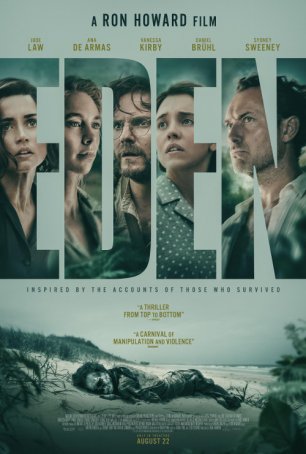
Ron Howard’s Eden takes inspiration from a bizarre
but true series of events in the 1930s, refracted through the lens of William
Golding’s Lord of the Flies. Set on the isle of Floreana in the
Galápagos chain, the film chronicles the escalating tensions among three groups
who quickly discover that the island’s 67 square miles isn’t big enough for
them all. What begins as petty uncooperativeness soon descends into theft and,
ultimately, murder. Howard stages several powerful sequences, including a
harrowing childbirth scene, but the film falters in its final act, losing focus
and stumbling toward an anticlimactic conclusion.
German expatriates Heinz Wittmer (Daniel Bruhl), his young
wife, Margret (Sydney Sweeney), and his son from a previous marriage, Harry
(Jonathan Tittle), come to Floreana after reading the published letters from
the island’s lone inhabitants, Dr. Friedrich Ritter (Jude Law) and his wife,
Dore Strauch (Vanessa Kirby). Their dual purpose is to escape from the chaos of
society and find an environment conducive to Harry’s recuperation from
tuberculosis. However, Friedrich and Dore, are less than pleased with having
their hermitage disturbed by outsiders and are less-than-friendly in their
interactions with their new neighbors.
Despite the thinly-veiled hostility evinced by Friedrich and
Dore, the Wittmers prove to be capable settlers and soon have a functioning
homestead. Two unexpected complications arise: Margret discovers she is
pregnant and another group arrives on Floreana’s shores. Lorded over by the
vain and manipulative Baroness Eloise Bosquet de Wagner Wehrhorn (Ana de
Armas), the three men in her entourage function either as her lovers, her
servants, or both. The Baroness, who intends to open a hotel on the island,
treats Floreana’s residents with contempt and condescension and soon isolates
both the Wittmers and Friedrich and Dore.
Thematically, the film’s debt to Golding’s Lord of the
Flies is clear. Stripped of civilization’s constraints, Floreana’s
inhabitants succumb to primitive impulses, with madness and rage surfacing in
unexpected ways. Even the usually mild-mannered Heinz is not immune. For
roughly its first 90 minutes, the film builds with a grim sense of
inevitability toward a cascade of violent events. But afterward, the narrative
loses momentum, wandering in search of an ending that honors both history and
cinema—two aims that prove not entirely compatible.
For me, the most compelling stretch of the film comes early,
as we witness the Wittmers grappling with the hardships of carving out their
corner of paradise. This world-building is unfortunately cut short with the
arrival of the Baroness, whose entrance brings an abrupt tonal shift that
disrupts the film’s initial rhythm.
The performances often feel mismatched, as if the actors
aren’t always inhabiting the same film. Jude Law and Ana de Armas adopt
larger-than-life approaches, commanding every scene they enter. De Armas’
flamboyance nearly tips into excess, while Law’s volcanic intensity matches her
beat for beat. By contrast, the rest of the cast plays things more
subdued—though Vanessa Kirby delivers a few memorably caustic moments, and
Sydney Sweeney anchors the film’s most gripping sequence.
Eden was something of a passion project for Howard—an
effort to venture outside the mainstream grooves of his recent work. He
financed it without studio backing, seeking a more personal vision. While the
film treads much of the same ground as the 2013 documentary The Galapagos
Affair: Satan Came to Eden—itself drawn from the rival memoirs of Dore
Strauch and Margret Wittmer—the fictional flourishes dilute some of the story’s
lingering mystery. Yet for all its flaws, there remains something hypnotic in
this descent into madness, enough to make Eden linger longer in the mind
than the average disposable August release.
Eden (United States, 2024)
